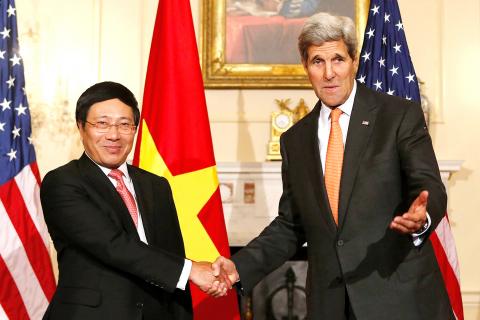Vietnam yesterday welcomed a decision by the US government to ease a ban on lethal arms sales, saying it would benefit both nations.
The US announced on Thursday it was partially lifting the ban, a move intended to help Vietnam defend itself in the South China Sea, where it is among Asian nations facing an increasingly assertive China.
Vietnamese Ministry of Foreign Affairs deputy spokeswoman Tran Thi Bich Van said in a statement that her government welcomes any step that aims to promote the Vietnam-US partnership.

Photo: Reuters
US State Department spokeswoman Jen Psaki told reporters that the US would now allow sales of lethal maritime security capabilities and for surveillance on a case-by-case basis.
US officials said the deals could include boats and air assets, particularly for Vietnam’s coast guard.
The US has not transferred lethal arms to Vietnam since communists took power at the end of the Vietnam War. A 1984 embargo prohibited arms sales because of concern over the Vietnamese government’s human rights record.
US officials say the easing of the ban recognized steps taken by Hanoi to improve human rights, including the release of 11 prisoners of conscience this year and progress on religious freedom.
Relations between the US and Vietnam were normalized in 1995, two decades after the war’s end. Washington approved non-lethal arms sales in 2006, and ties have since deepened further, particularly as the administration of US President Barack Obama has sought to expand US engagement in Asia.
Despite fraternal ties between the ruling parties of Vietnam and China, tensions spiked this year after China deployed a deep-sea oil rig near the disputed Paracel Islands (Xisha Islands, 西沙群島), which Beijing occupied from Vietnam in 1974. Taiwan also claims the islands.
“What’s driving this is not a sudden desire to transfer military equipment to Vietnam writ large, but a specific need in the region,” said one US official, highlighting what he called Vietnam’s lack of capacity in the disputed waters and the US’ own national security interests. “It’s useful in trying to deal with the territorial disputes in the South China Sea to bolster the capacity of our friends in the region to maintain a maritime presence in some capacity.”
About 40 percent of the world’s seaborne trade passes through the sea which is claimed in part by Taiwan, Vietnam, Brunei and Malaysia, as well as China and the Philippines.
A prohibition on sales of other kinds of lethal weapons, such as tanks, remains in place as Washington pushes Hanoi to improve its human rights record.

A magnitude 7.0 earthquake struck off Yilan at 11:05pm yesterday, the Central Weather Administration (CWA) said. The epicenter was located at sea, about 32.3km east of Yilan County Hall, at a depth of 72.8km, CWA data showed There were no immediate reports of damage. The intensity of the quake, which gauges the actual effect of a seismic event, measured 4 in Yilan County area on Taiwan’s seven-tier intensity scale, the data showed. It measured 4 in other parts of eastern, northern and central Taiwan as well as Tainan, and 3 in Kaohsiung and Pingtung County, and 2 in Lienchiang and Penghu counties and 1

FOREIGN INTERFERENCE: Beijing would likely intensify public opinion warfare in next year’s local elections to prevent Lai from getting re-elected, the ‘Yomiuri Shimbun’ said Internal documents from a Chinese artificial intelligence (AI) company indicated that China has been using the technology to intervene in foreign elections, including propaganda targeting Taiwan’s local elections next year and presidential elections in 2028, a Japanese newspaper reported yesterday. The Institute of National Security of Vanderbilt University obtained nearly 400 pages of documents from GoLaxy, a company with ties to the Chinese government, and found evidence that it had apparently deployed sophisticated, AI-driven propaganda campaigns in Hong Kong and Taiwan to shape public opinion, the Yomiuri Shimbun reported. GoLaxy provides insights, situation analysis and public opinion-shaping technology by conducting network surveillance

‘POLITICAL GAME’: DPP lawmakers said the motion would not meet the legislative threshold needed, and accused the KMT and the TPP of trivializing the Constitution The Legislative Yuan yesterday approved a motion to initiate impeachment proceedings against President William Lai (賴清德), saying he had undermined Taiwan’s constitutional order and democracy. The motion was approved 61-50 by lawmakers from the main opposition Chinese Nationalist Party (KMT) and the smaller Taiwan People’s Party (TPP), who together hold a legislative majority. Under the motion, a roll call vote for impeachment would be held on May 19 next year, after various hearings are held and Lai is given the chance to defend himself. The move came after Lai on Monday last week did not promulgate an amendment passed by the legislature that

AFTERMATH: The Taipei City Government said it received 39 minor incident reports including gas leaks, water leaks and outages, and a damaged traffic signal A magnitude 7.0 earthquake struck off Taiwan’s northeastern coast late on Saturday, producing only two major aftershocks as of yesterday noon, the Central Weather Administration (CWA) said. The limited aftershocks contrast with last year’s major earthquake in Hualien County, as Saturday’s earthquake occurred at a greater depth in a subduction zone. Saturday’s earthquake struck at 11:05pm, with its hypocenter about 32.3km east of Yilan County Hall, at a depth of 72.8km. Shaking was felt in 17 administrative regions north of Tainan and in eastern Taiwan, reaching intensity level 4 on Taiwan’s seven-tier seismic scale, the CWA said. In Hualien, the